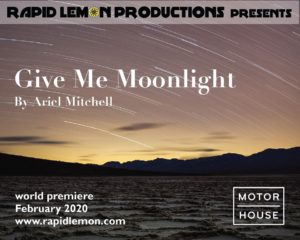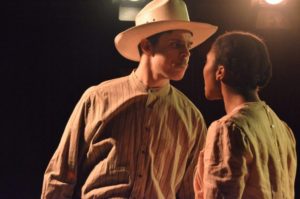 A guest post by Ariel Mitchell, whose play Give Me Moonlight was performed on February 7-16, at the Motor House in Baltimore, Maryland. Here is a summary of the play: “Some sorrow we bear alone. Some sorrow has to be shared. Give Me Moonlight is about the sorrow that is so deep that it can barely be felt let alone acknowledged in the bright light of day. This surrealist play tells the fictionalized true story of Bessie and Albert Johnson, a couple in early 1900s Chicago who seem to have everything. But when Bessie brings home a less-than-acceptable houseguest, the sorrows that have been festering under the surface come seeping through the facades she and her husband have created to protect their life and marriage. Based on the history of Scotty’s Castle, this new play explores why two people would risk what they barely have to build a castle for a con-artist in the middle of the desert.”
A guest post by Ariel Mitchell, whose play Give Me Moonlight was performed on February 7-16, at the Motor House in Baltimore, Maryland. Here is a summary of the play: “Some sorrow we bear alone. Some sorrow has to be shared. Give Me Moonlight is about the sorrow that is so deep that it can barely be felt let alone acknowledged in the bright light of day. This surrealist play tells the fictionalized true story of Bessie and Albert Johnson, a couple in early 1900s Chicago who seem to have everything. But when Bessie brings home a less-than-acceptable houseguest, the sorrows that have been festering under the surface come seeping through the facades she and her husband have created to protect their life and marriage. Based on the history of Scotty’s Castle, this new play explores why two people would risk what they barely have to build a castle for a con-artist in the middle of the desert.”
I count myself one of the lucky ones.
I was returning home from a walk with my boys, pushing the double stroller up the sidewalk when my husband, who works at the U.S. Department of Health and Human Services, texted me to tell me Broadway had closed. Indefinitely. “It’s a good thing your production was last month,” he said.
 Almost exactly a month before, my show Give Me Moonlight was having its world premiere at the Motor House in Baltimore. It is an amazing feeling to see a show that has only existed in your own mind suddenly become the purpose of an entire cast and crew until the dream is built into a reality. It is humbling. It is unbelievable, almost inconceivable. It took 7 years for this play to be produced. Partially because of my life’s journey and the piecemeal way I had to write because of it, and partially because in this surrealist piece I needed a producer, a director, and a company who could see the dreams in my head and believe they could work on stage. Oh, and also cover the theater in sand. But this past February it all came together and Rapid Lemon Productions built a play out of the desert.
Almost exactly a month before, my show Give Me Moonlight was having its world premiere at the Motor House in Baltimore. It is an amazing feeling to see a show that has only existed in your own mind suddenly become the purpose of an entire cast and crew until the dream is built into a reality. It is humbling. It is unbelievable, almost inconceivable. It took 7 years for this play to be produced. Partially because of my life’s journey and the piecemeal way I had to write because of it, and partially because in this surrealist piece I needed a producer, a director, and a company who could see the dreams in my head and believe they could work on stage. Oh, and also cover the theater in sand. But this past February it all came together and Rapid Lemon Productions built a play out of the desert.
At the beginning of the process we had just moved to the Washington DC area and I underestimated the traffic/my husband wasn’t able to return from work as quickly as I thought to be the active parent, so I vividly remember walking in late to the first table read. The actors were mid-scene, so present and focused it was palpable. I sat down and listened. I listened as the voices that had lived in my head for so long, that I had put away as I focused on my day to day caregiving, that had become detached from my life came flooding back only to leave and become embodied in separate beings. In that first moment, I watched the actors become my characters. At the end of the read, the producer invited questions for me from the actors. It was almost painful for me to dust off the cobwebs and stumble through answers to shed some clarity on the symbolic nature of the sounds in the play from which all of the dreams and flashbacks are created. I spent most of my experience with this production, my fourth production ever, trying to figure out why.
 I think it’s because the playwright is supposed to be dead.
I think it’s because the playwright is supposed to be dead.
Somehow I have the belief that I shouldn’t exist in the production process. I have this idea that as soon as the script is chosen it is handed over and then the company has to comb through it, piece together all the clues, come to understand the reality, and put it together on stage. Like you do with any of the dead playwrights, Shakespeare, Ibsen, etc. You get the play and make decisions. In college, my mentor would tell me that I should be dead. “Stage directions are worthless,” he’d say “the director can just throw them out.” So I’d spend hours and hours trying to put my action into the dialogue or plant clues as to what I wanted. I don’t know exactly where this idea of invisibility came from but it definitely was encouraged in my training. But then again I was also told by several playwrights who visited the schools I was trained at that playwrights shouldn’t be trained… so there’s that.
We exist in an industry of invisibility. We have a few people who are very visible. They stand in front of the audience to convey the story. But most of the people employed in this industry are ‘behind-the-scenes.’ All of the names in the credits. But in theater who even has those? You have to actively look in the program. As human beings we love story. There is something transportive about it, healing. We want to be lost in it. Knowing how it comes to be almost breaks the magic of it. I remember where I was sitting in my elementary school library when it clicked, “Hey, someone wrote this story.” I feel like that is happening now in this pandemic in a big way as we see just how many people have lost not only their livelihood, but also the light and comfort that only stories shown onstage can bring. We’ve lost a community we take for granted.
I try to actively tell my children about the author. I don’t know, it’s kind of become a point of pride as I am often the invisible storyteller as a playwright, as a mother, and as a woman. I exist behind the scenes. But I do exist. As President Nelson says women try to “…mold living clay to the shape of her hopes. In partnership with God, her divine mission is to help spirits live and souls be lifted. This is the measure of her creation. It is ennobling, edifying, and exalting.” But, I would add, it is invisible.
I am still navigating how much I tell and how much I let the story tell. In this production, I allowed myself the space to live in discussions with the director and actors as we all discovered together who these characters were and how they dreamed. That was in huge part due to the incredible, inquisitive, creative people I was blessed to work with. And those conversations made the play stronger. They made me stronger too. The playwright may be dead, but I am very much alive. It’s time for me to embrace that. I am grateful beyond words to the people who see that and go out of their way to make me a part of the process. I pray that this uncertainty ends soon and the vibrant life lived behind the scenes can bring theater to life again.
 Ariel Mitchell hails from a small island in the Chesapeake Bay. She earned her BA in Playwriting in 2013 from Brigham Young University and her MFA in Musical Theatre Writing in 2015 from New York University. She has written several plays including Give Me Moonlight, inspired by Scotty’s Castle in Death Valley, and A Second Birth, about an Afghan girl who was raised as a boy, for which she was awarded the KCACTF Harold and Mimi Steinberg 2013 National Student Playwriting Award, a Vera Hinckley Mayhew Award, and an AML Drama Award. Her MFA thesis was MORMONish (book and lyrics), a semi-autobiographical musical dramedy, which tells the story of a half Mormon, half Jewish girl searching for where she fits in a family where everyone believes something different. Her one-woman play The Shower Principle was a 2018 AML Drama Award finalist. As well as writing for stage, TV, and screen, she has also dramaturged many productions including The Completely Fictional — Utterly True — Strange Final Tale of Edgar Allan Poe at Centerstage in Baltimore, Steel Magnolias at the Echo Theatre in Provo, Utah, What the Bellhop Saw at the Utah Repertory Theater in Murray, Utah, and Selections from Gone Missing and The Cleverest Thief, a devised piece, at BYU.
Ariel Mitchell hails from a small island in the Chesapeake Bay. She earned her BA in Playwriting in 2013 from Brigham Young University and her MFA in Musical Theatre Writing in 2015 from New York University. She has written several plays including Give Me Moonlight, inspired by Scotty’s Castle in Death Valley, and A Second Birth, about an Afghan girl who was raised as a boy, for which she was awarded the KCACTF Harold and Mimi Steinberg 2013 National Student Playwriting Award, a Vera Hinckley Mayhew Award, and an AML Drama Award. Her MFA thesis was MORMONish (book and lyrics), a semi-autobiographical musical dramedy, which tells the story of a half Mormon, half Jewish girl searching for where she fits in a family where everyone believes something different. Her one-woman play The Shower Principle was a 2018 AML Drama Award finalist. As well as writing for stage, TV, and screen, she has also dramaturged many productions including The Completely Fictional — Utterly True — Strange Final Tale of Edgar Allan Poe at Centerstage in Baltimore, Steel Magnolias at the Echo Theatre in Provo, Utah, What the Bellhop Saw at the Utah Repertory Theater in Murray, Utah, and Selections from Gone Missing and The Cleverest Thief, a devised piece, at BYU.
